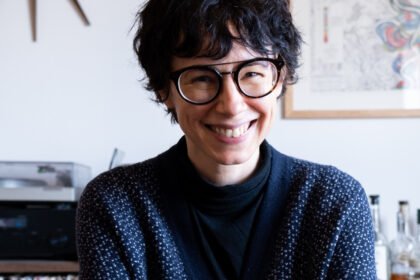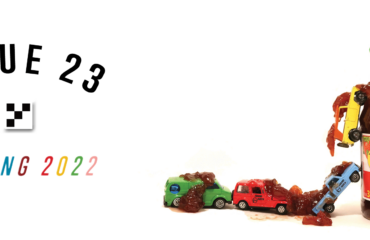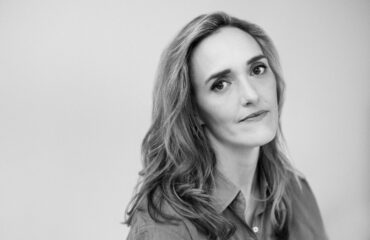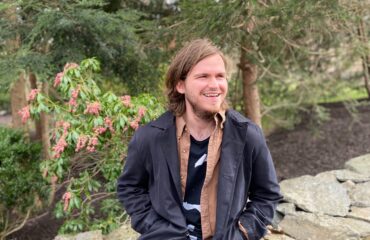THE GAIN by Jennifer Solheim

While conducting fieldwork in Morocco I lived in a women’s pension, female bodies in conversation. But I walked the streets of Rabat alone. I covered my blond hair with a headscarf, and plotted routes to marvel at the city with no distractions. The prayer towers and palm trees, the narrow neighborhood streets with vivid blue doors. The smell of roasted meats. Against my tunic and broad pants, homeless mutt flanks—only purebreds wanted. Then that acrid odor, the tell-tale stain on the wall. Whether dog or man, territorial pissings reminded me. This was male space.
When I was in coursework, I had pictured fieldwork like I was a spy, infiltrating masculine domains in Morocco, from mosques to soccer clubs to strip clubs, looking at social contradictions. But there are hypocrisies in every society. Once I began work on the Years of Lead, I saw that there was already a significant body of research on male space in Morocco, since all public space is male: cafés, shops, public offices, houses of worship, the streets. So I decided to work on the social and political memory of women in the harem, the private space within each home forbidden to men outside the family. Women dominate the harem—although “dominate” isn’t quite right. The mothers and grandmothers may set the daily schedule for cooking, eating, and cleaning, but ultimately the husband and father determines household mores and folkways. Like all spaces, the harem is also circumscribed.
My interview subjects were grandmothers, mothers, sisters. My favorites were the bayrat—the spinster aunts. I wrote an entire chapter on their particular understanding of King Hassan II’s reign, and how the bayrat’s intimate experiences shaped their memory of the political events during those thirty-eight years.
New eras always begin with such hope, it seems.
*
Maybe that’s where I should begin the narrative about Ingrid. With something hopeful.
Cultural anthropologist Ingrid is part of my new project, which focuses on mothers in American academia who live apart from their children because of their jobs. In my attempts thus far at a narrative about a mother, her twin sons and fraying marriage, I haven’t found the opening. Do I start with the birth of the twins? When she was hired as an assistant professor?
The working title of the project is Radiative Losses. I’m bringing together ethnography with physics and neuroscience. Radiative loss: the energy that flies off when an object moves in cyclical motion. Mothers who teach in one state drive or fly back to their children in another, on a loop, over and over again. What is lost in the relationship with her children? In her career?
The title implies the central question: beyond career, what is gained? I’d studied neuroscience in undergrad and always geeked on physics. I brought these fields together to focus my personal engagement, so I wouldn’t get too angry. If ours were an egalitarian society, women’s careers would be a given. So I refuse to categorize career as the gain. It should have been ours already.
Instead, I’m interrogating whether or not living apart from children for career means less tangible, invisible gains.
Of course, the father is involved here too. But in focusing on mothers in heteronormative, dual-career academic households, I’m looking at the parent who is more vulnerable by deign of gender inequality in the workplace and home. When Ingrid and her husband decided to marry and have children, they wanted to figure out career and family together. They had agreed: two academic careers in the same geographic area. Non-negotiable. Part of the plan. Her husband got his job first—she defended her dissertation when she was six months pregnant. Then, when the babies were just over a year old, her husband changed his mind.
Perhaps that’s where I should begin.
*
New York City, Upper West Side. Ingrid and the twins are doing what they normally do in the afternoon: looking out the window. The kids are leaving the middle school up the street. Boys in low-slung jeans, a few girls in hijabs, chatty adolescent English shot through with Spanish, Arabic, and other languages. This is the kind of place she wants to raise her boys. But they’re not settled yet. First she needs to get a tenure-track job, and she and her husband need to negotiate spousal hires with the university administrations.
She’s still unsure why they didn’t try to negotiate it when her husband was offered his position here. He kept saying one step at a time, and she was exhausted and distracted with worry about the Cesarean section. She was a first-time mother; it was geriatric pregnancy, the medical term for expectant women over 35; and with twins, it was considered high risk. Visceral, immediate, the pregnancy, the birth. An extra year on the job market had meant nothing.
Now, just as the boys turn one, a position in her field is announced. It’s in Chicago at a prestigious university, and the job description reads as if they had Ingrid’s research in mind.
No longer do the twins simply gaze out the window: they walk. Or rather, they careen and zigzag across the herringbone-patterned hardwood in the living room. Hugo stumbles and falls, hits his nose on the floor and begins to cry. Ingrid rushes him to the kitchen on one arm. She worries that Oscar will pull a lamp down on his head while she’s gone. Even with childproofing, things go wrong.
She holds the ice pack to Hugo’s tiny face.
“Da-dee!” calls Oscar. Ingrid looks down the street. Her husband is coming up the sidewalk. Time to talk about Chicago.
“Her husband” sounds sinister. I should give him a pseudonym, too. Felix. Or Mats. Try starting in medias res.
*
Mats makes gin and tonics and hands one to Ingrid. They settle into the living room together, the late afternoon routine: they have a drink and talk while he plays with the babies. He airplanes Hugo above the activity pad as Oscar reaches with his fat baby hands. He wants a turn. They’re learning early how to wait.
After Mats has given each boy a ride, he picks up his glass again.
“Exciting news,” Ingrid says. She tells him about Chicago.
“Exciting indeed,” he says. “So we can negotiate for a spousal hire both here and there, if you get an offer.”
“That’s the plan, man.” They high five. Kiss. Then, Mats retreats to the home office for email and grading while she gives the babies dinner. The hours are long, but the years are short. Once she gets a job, she won’t have these long stretches with just her and the boys. She should enjoy this time with them while she can.
*
Analysis is dependent on context in cultural anthropology. The data are rooted in specific and subjectively interpreted circumstances. Consider this example of Ingrid with the newborn twins in her lap, sore and bleary from the C-section, trying, and failing, to breastfeed.
The day before, she’d promised to call Mats’ mother back. But she’d forgotten, or maybe she’d let herself forget. Mats’ mother always finds some way to undermine him, and by extension, them. At least there is an us, Ingrid thinks as she hears the tension in his voice on the phone. Yet when he hangs up, he throws himself down on the couch. “How could you forget to call her? You know she takes it personally.” He heaves a sigh. “Our entire marriage is shit.”
The implication of “entire”: Ingrid couldn’t handle sex for the last few months of her pregnancy. And now look at her—per the doctor, no sex for at least six weeks. The wound in her lower abdomen might be only a few inches wide, but Mats even said it to a friend on the phone in the hospital: When he looked over the sheet to see the babies delivered, she looked like an open can of tomato soup.
She’s not sure if he knew she could hear him. Her eyes were closed. He probably thought she was asleep.
She sets the babies down on the floor one at a time, then teeter-totters into the bedroom and closes the door. She’s afraid if she cries too hard her stitches will break.
Mats is feeding the babies tiny bottles of formula when she comes back. “I’m sorry,” he says.
“We’re both exhausted,” she said. “Please be kind to me.”
Here the data show the ways in which Mats demonstrates a propensity for emotional cruelty—Ingrid’s first hints there might be trouble.
But then there’s the question of what this project is about: mothers and children? Or husbands and wives? It’s true the radiative losses are threefold: motherhood, career, and marriage.
Maybe the marriage is where I should begin.
*
Rabat, Morocco. Ingrid locks eyes with Mats at a research foundation cocktail hour. They talk about the keynote at the conference, their research. Ingrid is spending these months in follow-up interviews with the bayrat. Mats is in town for a conference on his specialty, late nineteenth century British lit. He’s in the third year of a postdoc and on the job market, again. They leave the cocktail hour together and find a snooker bar. They both like a good gin and tonic. Mats rephrases what she says to be sure he understands her. He gestures with his hands to emphasize a point.
Hours later, he walks her back to the pension. Somewhere between the street and the moon, a male voice, then a female one, both laughing and speaking in Darija. “I love my research,” Ingrid says to Mats. “And I want a home. Is that so wrong?”
“You’d like to settle down,” he says and laces his arm through hers. “Me too.”
“Have a family,” she says. “It can work. My dissertation advisor got a spousal hire.”
They see each other every day until he leaves. Then, over email and video chat: possibilities.
Six months later they marry. She’s already pregnant—age thirty-eight, and they went without protection just once. Our shotgun marriage, they quip.
*
When Mats comes home the week after the announcement of the Chicago position, he has a set look on his face. “I talked to my mentor about a spousal hire,” he said. “The administration’s not playing that game right now. If I tell them you’ve got an offer, they’ll just let me go.”
“They’d still give you the choice, right?” she says. “They wouldn’t fire you.”
Mats walks into the kitchen to make drinks. His shirttails are partially untucked. When he returns he hands her one glass and takes a sip from the other. Then he settles onto the floor with the boys. “They actually did let someone go last year. He’s now a visiting lecturer where his wife was hired.” Fancy talk for being hired to teach per class. Shit pay. No benefits.
“That’s me if I don’t apply for the Chicago job,” Ingrid says. “And Chicago is more affordable than New York.”
“What if you commuted?” he says. The tumbler with the drink is sweating.
“I don’t want to see you and the babies only a few times a month.” Why are they even having this conversation? This isn’t how they agreed it would go.
“We aren’t going to leave New York for a city of urban blight surrounded by cornfields,” he says.
“That’s just mean.”
“There were 145 applications for my position, remember?” he says. “They could replace me no problem.”
“Why didn’t we negotiate for me to get hired at the same time you did, then?”
“You were overwhelmed,” he says. “No way you could have performed in an interview. I mean, could you imagine the job talk? With you, what? Eight months pregnant?”
“That would have been badass.”
Mats smiles, wan.
“We agreed,” she says. “There was no question we would negotiate. That’s part of the reason I was willing to do this.”
“But there are the boys now, and I have a job I love.” He gestures around the room. “It’s no longer just a theory.”
*
To fly means to move through the air, the sky, or the upper atmosphere. Outer space. To be carried on the wind with metal wings. Lift, drag, weight, and thrust. It can also mean to flee. You can disappear or vanish. Extreme motion. Dissipation. To fly also means to avoid or shun.
An afternoon in Central Park. The boys are steadier on their feet every day. They napped at the same time today, and Ingrid is close to finishing the application for the Chicago position. Who knows if she’ll even get an interview? For now, she’s here at the park, a sunny autumn day with her boys.
A butterfly. The boys reach their hands so high they’re reeling to follow it across the sheep field, that enormous stretch of green. They never look back to see if their mother is behind them. When the butterfly rises too high for them to follow, they don’t cry. Just watch it go, creature in flight.
*
Chicago, next year. Ingrid has just finished teaching the first class of her first-ever graduate seminar. Now there’s a talk, an economic anthropologist who works on Russia. Should be fascinating. After the talk, a dinner with the speaker and other faculty. She’s heard about the restaurant where they have reservations. Local, foraged ingredients. A superb wine list.
Since the term started, she is so exhausted at night that she does not fall so much as thud into sleep. Like after sex. She and Mats really need to work on their relationship. She’ll talk to him about it this coming weekend, back in New York, with her boys. Of course it’s stressful to be apart.
Out the window, on a patch of campus green, she sees Ixel, one of her colleagues, a linguistic anthropologist. Ixel’s husband—a sociology professor—and six-year-old daughter have stopped by to visit her, since she will be out for the evening. Ixel kneels on the grass in her pencil skirt to look at something in her daughter’s hands.
Ingrid picks a stray hair from her new silk blouse and checks her phone. She finds two messages from the nanny in New York. One is about eating and napping. The other has a video of Oscar and Hugo in Central Park, dancing in front of a mariachi band. Four chubby legs, four arms ending in little fists. Watch them go.
*
Ingrid flies to New York on Friday. After the boys are asleep and one drink, Mats doesn’t want to talk. He wants sex. Absence makes the heart grow fonder, or at least lends the body an urgent need. It’s a plus.
Back to Chicago on Monday. Two weeks after that she flies back to New York again. She’s disoriented, almost dizzy.
Saturday afternoon and they haven’t managed to leave the apartment that day, even though they had talked about the Central Park Zoo. “I want to do meaningful things with them,” she tells Mats. “I don’t want them to forget me.” Hugo needs a change. She does it on the living room floor. He’s bigger than the last time. More wiggly, too.
“They won’t forget you.” Mats watches Oscar splat his open palms on the round, pounded metal table that Ingrid bought in a fit of nostalgia on the last day of her final Morocco trip. “You’re their mother.”
“Let’s talk about them living in Chicago with me next year.” She wrestles Hugo’s pants over his fresh diaper. “You could commute.”
“I don’t think so.”
“Why? It only seems fair.”
Mats stands with his lips pressed together and walks down the hall. “I didn’t sign up for this.” He knocks a picture with his shoulder and the frame smacks to the floor. Glass, shattering. “You wanted a family.”
Ingrid hurries the boys into their high chairs, dumps Cheerios on the trays. Then she turns back to Mats. “I made having a family my first priority.”
“You got a family. And you left.”
“I didn’t leave. You wouldn’t come with me.”
Bare feet into loafers. She thinks he’s going to clean up the broken frame, but no. “I’m going for a walk to cool down.” The door slams behind him.
The twins are crying. Ingrid tries to pick up Hugo, but he squirms and calls, “Da-dee.” Then he lets her take hold. Oscar, too. She arranges the three of them on the couch together, breathes them in. They should always be this close.
She turns on the television. The broken glass is not her responsibility. Sesame Street is so different from when she was a kid.
Mats returns at the end of the second episode. “That was uncalled for.”
“It was.”
“I’m sorry.”
He doesn’t kiss her, but she doesn’t kiss him either.
They straighten the house, order food. Later they put the twins to bed.
“You want a G and T?”
“I think we need to separate,” he says.
“Separate?”
“This isn’t a marriage,” he says. “It’s an arrangement.”
“We need to try to arrange differently.”
“That,” he says, “is what I am suggesting.”
She brings the tea table back with her to Chicago. When folded, it fits in a large suitcase, like the last time she left Morocco. She surrounds it with winter clothes, things she hadn’t yet brought with her. Pays the extra baggage fee. She needs to have something that makes her feel in the world. A place where the boys’ hands have been.
*
In cultural anthropology, you let the categories of analysis arise from ethnographic data.
Ingrid needs to articulate her own narrative. If I were interviewing her, the first person would be a simple matter of transcription.
*
She retains a lawyer in New York, arranges an extra day in the city so they can meet. The lawyer has an asymmetrical haircut, abstract art on the walls, a glass-topped desk. “Without a signed agreement,” she says, “you gave up control of both career and family by marrying, moving with him, and giving birth to the boys in New York, where he was the one with the job.” No pre-nup. No recourse. She advises Ingrid to let Mats file first. Better chances—though still not great odds—for her to get custody that way.
Ingrid imagines what it would feel like to break the glass on the desk. A single gesture, a knifehand strike. The shower of glass would feel like water before it began to sting.
*
In Chicago she continues to get videos from the nanny, and now Mats sends photos as well. Here he is in the frame with Oscar and Hugo. Not a selfie. Someone else took this picture. A woman? Maybe that’s why he wanted to separate. Ingrid is not sleeping well. Who is behind the camera? Is she trying to steal my boys?
*
There it is. The first person. Of course I needed to start from Chicago. Easier that way. From a distance.
*
My graduate students give me a standing ovation at the end of my final seminar lecture. I cry. Some students look uncomfortable. I keep saying thank you. They don’t understand how grateful I am for this gesture of appreciation, of goodwill.
I’ll be in New York for over a month, an Airbnb in Washington Heights. Oscar and Hugo will be with me almost every day. Gratitude for this, too. I’m working on mindfulness with a therapist.
Then I’m served papers just before Christmas. Mats claims abandonment to argue for custody. The lawyer with the haircut says I should steel myself. In New York State, an abandonment claim normally takes at least one year of residing apart without one partner’s consent. But given that my position in Chicago is permanent, his claim might well work.
*
Rabat. Shortly after I first met Mats. I have tea with Safaa, age thirty-three. She walks with a limp in her left leg from a motorbike accident when she was a child. She speaks Darija and French and some Spanish, can read six different languages. She’s made ghoriba shortbread cookies to go with our tea. The king died in 1999 when Safaa was twenty-two. Then her fiancé left her and she started “to seize with terror.” The symptoms sound like panic attacks: shortness of breath, tightness and pain in her chest. Sometimes she couldn’t feel her hands. The memory of the king’s death is bound up in her fiancé’s abandonment. The numbness.
“So what is it you think about,” I say, “every year now, when the state honors the death of Hassan?”
She sets her gold-rimmed glass on the pounded metal table beside her and raises her arms to shoulder height, splays her fingers wide, and examines her hands. “What I think?” She wiggles and flexes her digits. “It’s how I feel. My hands always go numb again.”
It’s a revelation, something blooming: through individual experience of events that shape history, what happens within the body of women and girls in the harem shapes social and political experience, which in turn informs collective memory. This is the major claim of my argument, although during this visit with Safaa I don’t know that yet. Before this theory arises, I must pack my notes, my headscarves and tunics, my last-minute souvenir tea table, and fly away.
*
Winter term in Chicago begins in two days. I’m at the airport. Again at the gate. I’m writing. Okay
I work as little as possible during break while with Oscar and Hugo. When they call out for me in the morning, I fly into their room. I need every last minute by their sides. When I’m not with them, my body aches.
That is part of the radiative losses, too. Physical pain. It’s the pain if not the rumination that keeps me from sleep. I need to be sure pain is part of my data set. Within the body informs without. This is how I can tie my first project to this new one. I can expand on the ideas of physical, collective memory with neuroscience.
Theory is getting me through.
Goodbye is where I begin.
I book the latest flight possible. When I drop off Oscar and Hugo, Mats isn’t there. How does he get custody when he doesn’t bother to welcome them home? “Daddy’s with Miss Zephyr,” the nanny says to the boys.
“Zephyr,” I say, “Like the wind.”
“Depha!” Hugo says, arms flying into the air. They seem to know this friend of Mats’. I could use this in court, maybe. I didn’t take a photo after he’d knocked the picture from the wall. That would have been something.
I’ve learned my words mean nothing, even in first person.
The nanny smiles. “We’ll stand in the window to watch you go.”
I bend down to eye level with my boys. “I’ll be back soon.” I kiss their faces. “Look up in the sky after dinner.” Four palms, two necks. I breathe in their smell and gather them to me, as close as we can be. I marvel at our nearness, measure it in time, space, effect, and degree.
It’s perspective, as Safaa said. It’s not what I think, but how it feels within when I am without. The pain is sharp, defines me.
“You’ll see me fly,” I say. “I’ll wave to you.”


